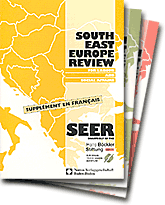Slovenia and south-eastern Europe – re-establishing traditional economic partnerships
Slovenia and south-eastern Europe – re-establishing traditional economic partnerships
Author(s): Anton RupnikSubject(s): Politics / Political Sciences
Published by: Nomos Verlag
Keywords: Slovenia and the Balkans;
Summary/Abstract: One of the most visible factors shaping Slovenian foreign policy was its separation from the state which it had belonged to since the First World War. This area, which the great Croatian writer Miroslav Krleža lucidly called ‘the Balkan pot-house’, was somewhere where Slovenia had felt like a foreign body, despite its proven adaptability. At the same time, Slovenia successfully regained its traditional central European identity; for nearly seven centuries it was part of the Hapsburg Empire. The war triggered by the former Yugoslav People’s Army on Slovenian territory, lasting ten days in June-July 1991, resulted in relatively painless independence for Slovenia, without severe trauma, which reflected the resoluteness with which most Slovenes experienced more than seven decades of shared existence in Yugoslavia, without either hesitation or prejudice. It is only in the aftermath of this radical break does it become possible to examine the actual position of Slovenia, and the role that Slovenia has played in stabilising the conflict in the Balkan area, and the role the international community (particular the 'West') expected and still expects of Slovenia. Any reservations, which were felt many times at the beginning of this process, were only overcome once Slovenia finally broke out of the vicious Balkan circle. Only then could the opportunities in the region be clearly identified and realised.
Journal: SEER - South-East Europe Review for Labour and Social Affairs
- Issue Year: 2002
- Issue No: 04
- Page Range: 67-80
- Page Count: 14
- Language: English

